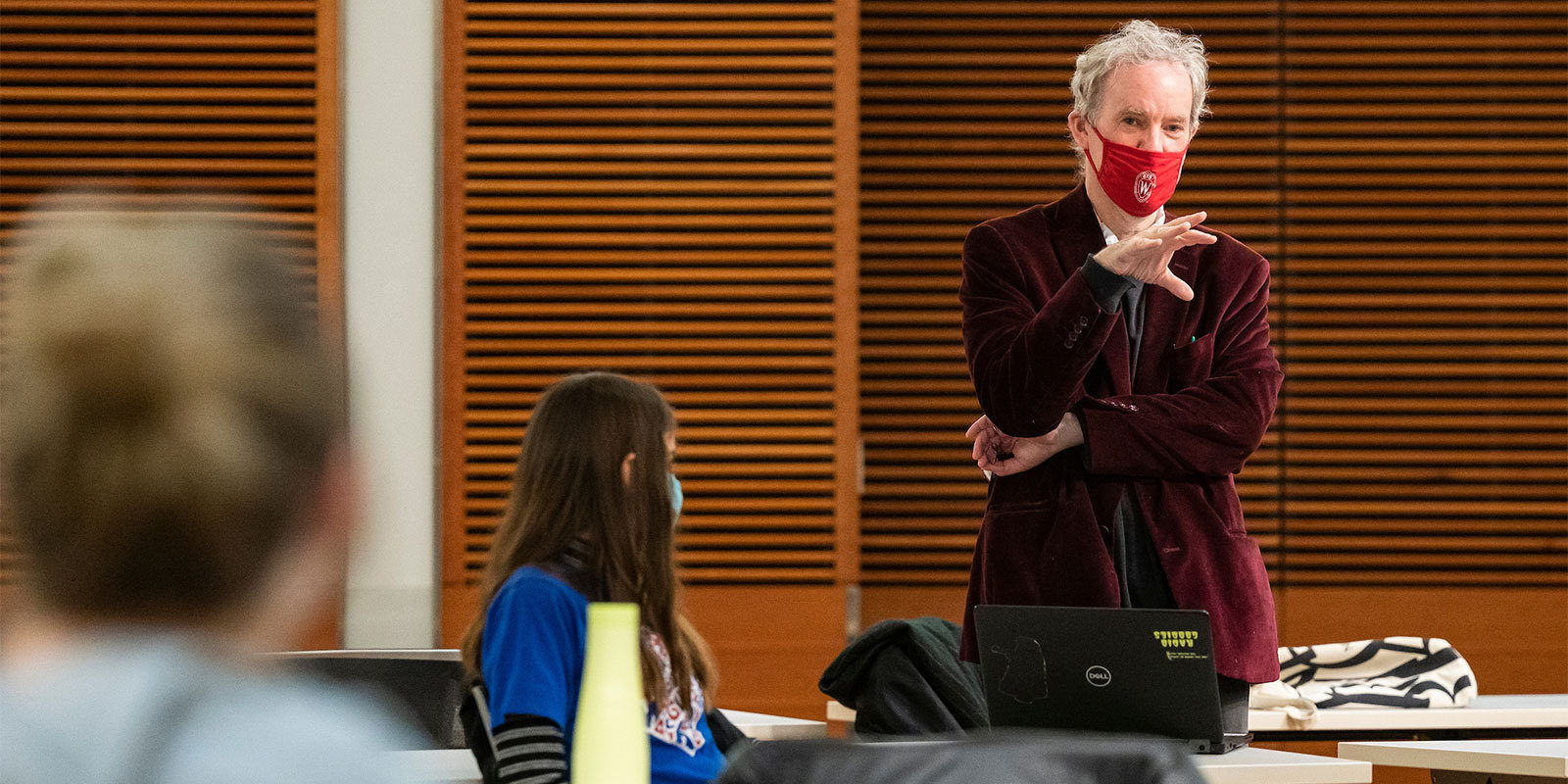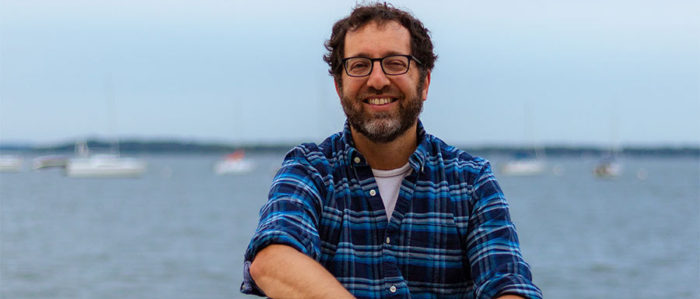There’s always been something a little unusual about the title of UW-Madison’s annual course and public lecture series on the Wisconsin Idea, an offering that dates to 2015.
There’s a big ol’ question mark right in the middle of it.
Curated this year by Mildred Fish Harnack Professor of Philosophy and Carol Dickson Bascom Professor of the Humanities Harry Brighouse, students in the 2023 edition of “Forward? The Wisconsin Idea Past & Present” have spent the last 12 weeks examining UW-Madison’s signature philosophy — that the boundaries of the University go beyond the classroom and extend to the boundaries of the state, nation and the world. They’re exploring its origins, its sometimes-troubled history and its positive potential in the modern era.
It’s the first time the class has returned to in-person sessions since 2019. Each Tuesday evening beginning in September, students and members of the community have attended presentations by UW-Madison faculty and other non-UW experts, representing different parts of campus and the state. Students taking the course for three credits meet the following day with Brighouse to discuss what they heard and what they learned.
The question mark, meanwhile, has always been a central part of the course.
“The Wisconsin Idea, going forward, is not going to be exactly the same as it has been in the past,” explains Brighouse. “Is it something that we're committed to as an institution that has a much more national reach for our undergraduates than it has done before? What does it mean when you have an undergraduate body that is much less Wisconsin? It's genuinely a question mark about sort of what it means going forward.”
To wrestle with the question, Brighouse put together a lineup that included several L&S faculty members, as well as Diana Hess, Dean of the UW-Madison School of Education, Cory Mason, the current Mayor of Racine, WI, and Kacie Lucchini Butcher, the Director of the Rebecca M. Blank Center for Campus History and one of the curators of last year’s Sifting and Reckoning exhibit.
Ryan Almizyed, a senior who graduates this month with degrees in computer sciences and computer engineering, was, like a lot of the students in the class, aware of the Wisconsin Idea, but had never really explored it in detail. He found himself fascinated by the presentation given by Adam Nelson, a professor of history who detailed the Wisconsin Idea’s genesis in the days when the UW first became a land-grant institution.

“The Wisconsin Idea was a controversial thing back then,” says Almizyed. “Not only was it controversial then, but as the Wisconsin Idea transformed over the next century or so, it was also controversial with every new form it took. I never quite realized that. We are still grappling with what it means, and it remains controversial.”
Brighouse explains that the Wisconsin Idea’s earliest days, when the University was led and populated largely by elite white males, have given way to more modern discussions about the tension between democracy and academic expertise. The idea that the latter always trumps the citizens of Wisconsin can be a dangerous assumption.
That’s why both Brighouse and Almizyed were moved by the September presentation given by Monica Macaulay, the Ada Deer Professor of Language Sciences, who is working with Wisconsin’s Menominee tribes to create an educational curriculum centered around a dictionary of their language.
“There's this whole idea of working with a people versus studying a people or a language,” says Almizyed. “That's exactly what the extension part of the Wisconsin Idea is — here's an expert that is going to the people and providing a resource to them that they can use.”
The students who take Brighouse’s philosophy classes come from predictable places —mostly business majors and psychology majors, along with those pursuing a philosophy degree.
“This class hasn’t been like that at all,” says Brighouse. “There are science majors, communicative disorders majors, economics and history. They come in groups together and they all sit together. They're talking with each other. They're just these people who've been attracted by an idea, essentially. Didn't know much coming in but are excited about thinking about it. So that's the thing I've really enjoyed.”
Most years, students complete the course by submitting a final paper. This year, Brighouse’s cohort has opted for something different: They’ll be creating a multimedia website based on the content and stories they’ve experienced this semester.
Continuing the Conversation
Some of the students in Brighouse’s Wisconsin Idea course were kind enough to share their thoughts about their experience.
Daisy Jagoditsh, a junior pursuing a degree in philosophy with certificates in Scandinavian studies and in political economy, philosophy, and politics (PEPP):
“The change in my thinking about the Wisconsin Idea was really that I thought about it at all. I didn't even know that it existed before I took the class, and I don't think that I am unique for that. When I ask friends and other students what they know about the Wisconsin Idea, the answer has literally always been that they've never heard about it. I think that is terrible because it is such a cool part of our history and beyond that, it is such an important topical thing on our political scene as well as in our lives as students. I kind of think that everyone should take this course, because it is so important to think broadly about the institution that we are attending and what its goals should be. Of course, this can help us make the institution better, but perhaps more importantly, it makes us more reflective about our education, which can help us get more out of it.”
Zalaire Fellows, a sophomore pursuing a degree in communication sciences and disorders:

"This class has changed the way that I think about the Wisconsin Idea by opening my eyes to the different ways that the idea is still very prevalent, that it is not just some historical concept with no relevance today. I knew close to nothing about the Wisconsin Idea when I started this course, and as I finish this semester, it is safe to say that this class has greatly helped shape my thoughts on the Wisconsin Idea and how we as students can use the concepts of the Wisconsin Idea to benefit the greater good. Overall, my experience with this class has been a very positive one, and I would absolutely recommend it to other students."
Max Patterson, a senior political science major with certificates in European studies, history, and classical studies:
“My favorite speaker session was Diana Hess's lecture on the creation of the Discussion Project and the need for the University to create a more inclusive environment that cultivates high quality discussion. Dean Hess touched on many aspects of discussion, including how we can create better environments in our classrooms and that the project was created in response to various racist incidents on campus. One point of emphasis, however, was that discussion and the ability to participate is a skill. Just like anything else, it can be improved. Hess expressed the importance of diverse engagement in the classroom. This diversity could mean race, but equally important is diversity of thought. One of the aspects of the class that I find most interesting is the idea of student engagement and what responsibilities the student has for their own education. While professors can organize their classes in ways that are conducive to discussion and catalyze engagement, students' personal agency has to be acknowledged. Discussion only happens when students choose to engage with the material they are being presented with. “



